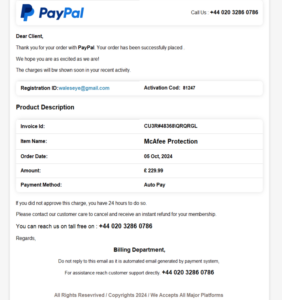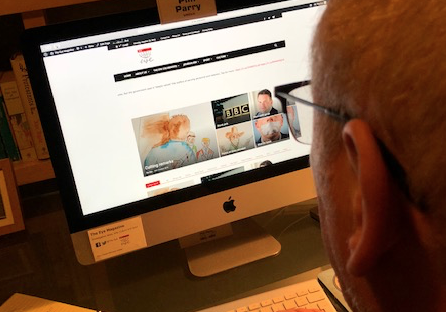- Death wish - 23rd February 2026
- Return to sender - 20th February 2026
- Legal eagle - 19th February 2026

During 23 years with The BBC, and a 41 year journalistic career (when he was trained to use clear and simple language, avoiding jargon), for our Editor, Welshman Phil Parry internet scams were unknown at the beginning, but now as the year’s end approaches it is clear that 2024 is likely to be the worst ever for them.
It looks like this will have been the worst year ever for scams.
Indeed one study has found that 42 per cent of UK adults have been targeted by an internet scam in the last 12 months.

We have seen an increase in fake parcel delivery texts, social media marketplace scams and AI voice cloning.
Young adults aged 18-24 have been the ones most targeted this year with 55 per cent approached by scammers in the last 12 months and 60 per cent either experiencing financial loss themselves or knowing someone who has.
Families in Wales have suffered the most significant increase in fake parcel delivery texts, with 40 per cent of people reporting a higher risk of these scams in the last 12 months, which is 11 per cent above the UK average

Scams are, unfortunately, only likely to increase too, with the financial year’s end almost upon us. The Welsh Government (WG) is very aware of this, offering advice such as: “How to avoid and report tax scams and keep your personal information safe when communicating with us at the Welsh Revenue Authority (WRA)”.
As our gmail address on The Eye is public, we have to counter an almost daily barrage of scams, between interesting nuggets of information from whistleblowers.
Now rather than crude requests for financial help from a Nigerian prince, the scammers lure in unsuspecting victims by taking a logo from the internet which contains an official-looking demand for money.

 This is the latest one we received a few days ago, where they were asking for £796.49 (for your information we NEVER use PayPal): “Dear, Your help is needed to verify the information related to your PayPal
This is the latest one we received a few days ago, where they were asking for £796.49 (for your information we NEVER use PayPal): “Dear, Your help is needed to verify the information related to your PayPal
account. Thank you for your cooperation! Best Regards,”
These may seem ridiculous, especially if no name is attached, but THOUSANDS of them are sent out, so if only ONE hapless individual takes the bait, it is worthwhile. Further pieces of nonsense in the past have been:
Attention Beneficiary
My name is Bernard Lauwers, Finance Director of the International Monetary Fund (IMF). Note that you have received this payment notice because you have been confirmed a legal beneficiary of the said compensation fund worth $10.7 million dollars from the United Nations Compensation Commission in Conjunction with the International Monetary Fund….
Hence, you are advised to acknowledge receipt of this email as soon as received to enable us to confirm that your email address is still active before we can furnish you with further details of your payment today.
Best Regards,
Mr. Bernard Lauwers
Finance Director of the International
Monetary Fund (IMF)(601)
Address: 700 19th Street, N.W, Washington, D.C. 20431, USA
Another one supposedly came from the Royal Bank of Scotland (RBS) (which we don’t bank with anyway), and declared:
| Dear customer,
To protect your security, we`ve now decided to stop any further spending on your RBS Debit Card. This is due to a recent changes on your account persoanl information. (eg: Billing address, Phone number) To ensure its real you Banking or Shopping Online. We need to verify your account personal information. This will help us in safeguarding your account and financial assets from unauthorized use at no cost. Sincerely, Royal Bank of Scotland Security Team |


As these ludicrous requests show they have become more sophisticated, so rather than demanding money straight out some will try to entice you in.
There is the one where a ‘relative’ will ask if you can help them.
This appears perfectly innocent, but if you answer positively you will then be confronted by a message that he or she can’t get to the shops, and asks if you can buy a gift token for a dying friend and send it to them, so you may feel heartless if you don’t do this, but it is, of course, a scam.

What they then do is take the token to the designated supplier, and get a refund in cash which they then pocket.
Or there’s the one offering you a ‘receipt’ for goods you never ordered, and giving a phone number for queries.
You are then tempted in and might give your bank details, but to the last one I asked: “Are you happy being a scammer?”.

A recent one we got which aroused suspicions because of the way it was worded (again supposedly from ‘PayPal’), was:
“Dear Valued Client,
team is working hard to ensure a quick and secure delivery. Your trust
is greatly valued”.
But don’t trust this kind of foolishness at all – only value information you have triple-checked yourself.

As we do on The Eye!
The memories of Phil’s astonishing, decades long award-winning career in journalism (when scams were rare at the beginning) as he was gripped by the neurological disabling condition Hereditary Spastic Paraplegia (HSP), have been released in a major book ‘A Good Story’. Order it now.
Tomorrow he looks at the importance for his journalism of using trustworthy information, unlike that from scammers.









